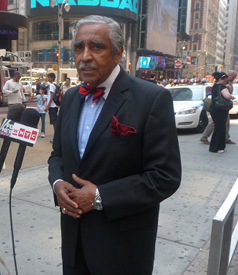Honest, paywall-free news is rare. Please support our boldly independent journalism with a donation of any size.

After a nearly two-year investigation, a House subcommittee ethics panel formally charged Charles Rangel (D-New York) with 13 ethics violations. Congressman Rangel has been charged with improperly soliciting donations for a public center and library bearing his name and omitting over $600,000 of income and assets on disclosure statements. Is this déjà vu all over again?
The people of Harlem have seen this before. The Reverend and Hon. Adam Clayton Powell, Jr. represented Harlemin the US Congress for 26 years and, during his tenure, served as chairman of the powerful Education and Labor Committee. Following allegations that Powell had misappropriated committee funds for his personal use, the House Democratic Caucus stripped Powell of his committee chairmanship. The full House refused to seat him until completion of an investigation by the Judiciary Committee. Rangel defeated Powell in the Democratic primary in 1970. It is important to note that unlike Powell, Congressman Rangel was not charged with intentionally violating any law, rule or regulation; and has not been charged by the committee with misusing his public office for private gain.
Congressman Rangel has represented the people of the 15th District of New York for 20 terms – 40 years. It’s the people of Harlem that have been the direct beneficiaries of his leadership and it’s those same people who will be put on trial along side the Congressman, if in fact he does stand trial. At the end of the day, it is the people of Harlem that really matter, and no matter how this works out for Rangel, it’s a sad day in Harlem for them.
Charles Bernard Rangel was born in Harlem on June 11, 1930, and grew up during the time when Harlem was the epicenter of African-American life and culture. His life and politics have been shaped by the people of Harlem. Throughout his political career, he has been a strong voice of support for social programs such as Medicare, Head Start, Social Security and Temporary Assistance for Needy Families (TANF). Congressman Rangel understood the impact that drugs were having on the community long before that issue became a political football. As a member of Congress, Rangel has used his personal power and the power of the committees that he as participated in and chaired for the good of the people. In spite of all of this political history and accomplishment, Rangel has relinquished most of his political power to battle for his political life.
What gets lost in the debate about ethics charges, trials and parking violations (the case of the idle Mercedes) is the debate about the interests and needs of the people of Harlem, the people that Congressman Rangel serves. What gets lost in the focus on his personal battles is an understanding of the positions he took in 1969 on the Vietnam War; his position that the War on Drugs was anti-people – you can’t focus on the user and not the supplier; or his 2003 stand to “democratize” the military to ensure that those with the least were not sacrificed to protect those with the most. It’s been about the people.
Congressman Rangel and his attorneys will wrangle with the House Ethics Committee over a trial or censure, and the voters in New York will determine his and their political fates. As Speaker Pelosi said, “The chips will have to fall where they may politically.” It is unfortunate that such a stellar career has come down to this. Forty years of Congressional service balanced against 40 pages of ethics charges; it’s a sad day in Harlem.
Media that fights fascism
Truthout is funded almost entirely by readers — that’s why we can speak truth to power and cut against the mainstream narrative. But independent journalists at Truthout face mounting political repression under Trump.
We rely on your support to survive McCarthyist censorship. Please make a tax-deductible one-time or monthly donation.